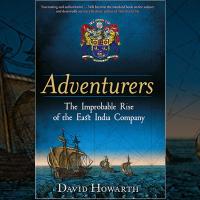Adventurers tells the story of the improbable rise of history's most notorious company, from its international, intellectual and cultural origins in the sixteenth century through to its first great challenges during the reigns of James I and Charles I. It is an astonishing tale – to match an astonishing journey – that is almost always overlooked in the popular histories of the East India Company. Yet despite its seeming insignificance in some of these grander narratives, focused as they are on the exploits of the likes of Robert Clive and Warren Hastings, it is by no means uninteresting – or irrelevant.
We all think we know the East India Company, the go-to 'baddie' of everything from serious histories to Pirates of the Caribbean: determinedly evil, mercenary, dictatorial, cruel, and very nearly unstoppable. We know so much about the crimes it committed, the problems it caused, the casual and particular racism brought about through concerted efforts at colonizing and disdaining native populations. And we read this knowledge, our opinions, backward to the EIC's very beginning: a plant this wicked must be stinking to its core, to its roots.
Adventurers successfully challenges this dominant narrative. Unlike some other companies – both English and foreign – the fledgling EIC was not driven by a need to colonize or subjugate, but by greed alone. Whether the grasping jealousy of the first Company members is something to be applauded is beside the point and, indeed, anachronistic judgements that tell us more about our own time than theirs are left out of the book almost entirely. As David Howarth succinctly, and correctly, states, 'historians would do well to look resolutely forwards, not backwards.' We should not read our own 20-20 hindsight back onto something that the protagonists could never have foreseen. This is one of the author's main bugbears and, quite possibly, one of the drivers behind his initial putting of pen to paper. Other bugbears are equally clear: the furore over the Amboyna 'Massacre' is neatly dissected; the disdain for the early Stuart kings is shot as so many well-targeted barbs dipped in the acid of sharp wit, piercing to the very heart the problems of the early seventeenth century.
The other element of historians employing hindsight is the assumption that the EIC was bound to succeed, to become a huge and defining influence in the modern world. Howarth questions the notion that, as William Dalrymple suggests in the subtitle of his most recent book on the Company, the rise of the EIC was somehow relentless, a foregone conclusion. Despite this, the impression garnered from Dalrymple’s offending book, The Anarchy, is that there was nothing more certain in those early years of the Company's life than that it was doomed to die an early death. Yet where The Anarchy concentrates on the eighteenth century, Adventurers doesn’t roam beyond those first unlikely groping voyages, and the emphasis on the sheer improbability of triumph is thus all the greater. The immense uphill struggle just to get the Company up and running – bearing in mind that its first governor was lucky to escape the hangman's noose following the Essex Rebellion – let alone the enormity of the task of catching up with, and then overtaking, rivals who had been much more successful for a much longer period, is breathtaking in its unlikelihood. Luck, and the right people at the right time, is what kept the EIC going.
These are the points that Howarth wants to stress, and he's done a fantastic job of it. Characters are multi-coloured and multi-faceted, draped in English wool and Eastern silk, carrying Foxe's Book of Martyrs in one hand and life-sized pictures of naked ladies in the other. While there is judgement, there is no prejudice and the movers and shakers from across the globe are introduced to us in all their complex glory, seen as they would have been by their contemporaries, warts and all. There is humour and joy in relating the tale; alongside the thorough knowledge of early modern economics and Company sources, there is a wit and lightness of touch that makes the reader want to explore further. There are, of course, questions that remain: as Howarth freely admits, much more needs to be written, for example, on the role of women or the society of the factors. And, I must admit, I feel a little bit short-changed that the journey stopped when it did: the full impact of the reign of Charles I, of the civil wars and the Protectorate, as well as the Restoration, all need attention. I'm keeping my fingers crossed that there might, at some point, be a further volume to continue the story. Perhaps Howarth, rather like those first Adventurers he describes so well, will have just the right amount of intrepid bravery and insanity to attempt it.


